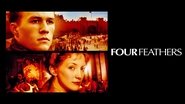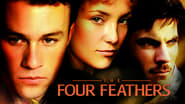Beystiman
It's fun, it's light, [but] it has a hard time when its tries to get heavy.
Afouotos
Although it has its amusing moments, in eneral the plot does not convince.
Erica Derrick
By the time the dramatic fireworks start popping off, each one feels earned.
Kamila Bell
This is a coming of age storyline that you've seen in one form or another for decades. It takes a truly unique voice to make yet another one worth watching.
ThatMOVIENut
The latest of many versions of A.E.W. Mason 's iconic colonial epic, a young British officer (Heath Ledger) resigns right before his regiment is set to aid British Forces in the Sudan. This is seen as cowardice and he is given four white feathers, including one from his fiancée (Kate Hudson), as a symbol of his desertion. Now he must journey to Africa, reclaim his honour and aid his friend (Wes Bentley) from afar.Sadly neither very powerful nor epic, the newest 'Four Feathers' is little more than another 'Titanic' romantic history bandwagon chaser. It's biggest strength is the production: Shekar Kapur's (Elizabeth) direction is sweeping and large, enhanced by great costumes, sets and location filming that does make you believe you are looking at colonial Africa, with the last doomed battle a great action showpiece. Veteran James Horner's score, while not among his best, is still competent and gives the needed bombast and emotion to scenes, sometimes more than the screenplay. Its mostly young cast give decent performances, especially the always dependable Ledger as our troubled lead, though Hudson and especially Bentley wade through middling accents, and the rest leave not much of an impression.And about there is where the positives end: the screenplay, with several writers attached including Bruce Joel Rubin and Hossein Amini, is frankly a snooze for the most part, with thin characterization, lazy symbolism and, honestly, a lack of clarity or focus on its themes or messages. You'd think it'd be mostly dealing with questions about courage and bravery, perhaps even a timely take given Iraq and Afghanistan, but the film diverges into a bunch of other territories including colonialism, faith, identity, social classes, romance and does nothing interesting with any of these. Furthermore, because it is so clunky and cluttered with all this junk, the pacing often suffers, with the middle being a pain to get through as we endure long stretches of Ledger just wandering about the desert. If it was trying to be pensive or deep, it really backfired.In the end, baring some big battles, this is a safe skip. Its only remarkable feature is how completely and utterly unremarkable it is.
chucknorrisrules
I have often taken part in studying Victorian history (partly due to my interest in steam trains)and have recently moved on to Imperial history (which previously only extended to the railways laid in India and Africa) and I have learned a lot. Therefore this film has been of a lot of interest to me. The premise is a solid one. Heath Ledger plays Harry Faversham a British army officer in the late Victorian period of the 1880s-1890s. Peacetime soldiering is uneventful, with marriage to his fiancé imminent, but when a violent clash occurs between Islamic fighters in Sudan and the British Army, Faversham seems uneager to go to war unlike his friends, and returns o be with his fiancé. Unfortunately, all of them take a dim view of these actions, and they deliver him four white feathers as symbols of his perceived cowardice.Desperately keen to prove them all wrong, Faversham heads out to the Sudan to return the feathers back to his friends as the war spirals into disaster. And this is where things start to go wrong in the story. The characters are split up by the results of the battle, and Harry's redemption seems a little lacking in climax. This seems odd, as the previously solid structure of the film seems to break apart in the battle with the British defeat (when in reality this was actuall a victory, and could've kept the story intact had it been kept this way).All the character journeys seem to confusingly switch from one to the other, including a brief love triangle that doesn't seem to work in its execution. Surprisingly, there are few moments in this film of the British as brutal monsters, the closest we get is a bit with Djimon Honsou's character being whipped for an unclear charge, but if the director Khapur wished to explore this theme he hasn't made it clear enough to the audience. In general, the final part of the film is touching in its performance by the generally good main cast and sympathy for the main characters, but unfortunately comes across as too insubstantial to be worth paying for.
Blueghost
There's a lot of stunning imagery in this pic, but the director's aim here is to educate the public on the political realities of empire building; foreign and domestic. The director is not sympathetic to the British in any way, and it shows in this film.We have some superb cinematography for an historic epic focusing on four disparate comrades of "Her Majesties Army". But note, we don't come to sympathize with any of them. We don't come to care for any of them. We don't get attached to a single protagonist. One wonders why that is.It's because we're truly looking at a historical drama that asks us to follow the characters from A to B to C, but only from the vantage of a distant viewer, and as audience members engaged in the emotional outcome of the drama, we're left high and dry in this regard. This is a very objectifying work. We see the harsh realities of colonial warfare, but there's no sense of wanting or needing some or any of the characters to live. We're almost looking at an anti-British film. Something that comes near to being pro-Islam, but is more anti-colonial in its stance than a prostelizatizn of some other political thought.But, does that make it a bad film? No, not really. I did like watching it for the visuals, but I did feel somewhat empty. On my first viewing I thought and wondered how anyone could not like this picture, because I thought there was a heartfelt attempt to show the plight of everyone. And that's the irony of it all. Because the film is so thorough in its depiction of hardship, you never get a sense of where to position your own emotional investment as per my previous paragraph.As a stand alone film I think it's okay, but nothing to write home about in terms of being a fully realized drama. The acting is is actually quite good, though overstated at times. The late Heath Ledger tries to infuse the sublime in his thesping as he takes on the dual persona of a young officer who's scared to go to war, but later tears down his cowardice after his trials in the Sudan.Something that might've helped this film would have been for the characters to have realized who and where they were; i.e. what they were doing (to channel a little Yoda here). Yet again, all we see is what one might call the emotional plot. The actions and the reactions of the characters. We never truly get to look into their hearts.Mores the pity.Rent it for a night's viewing. The actual story is pretty decent, and worth seeing because of some very impressive cinematography. But, don't be surprised if you feel a little empty at the end of it.
superkat2010
dude, so there's like these British troops in... Britain... and they're gonna send them all to like the Sudan and heath ledgers like "F#ck this sh!t, i wanna marry this chick" and then his friends are like "You're a motherf#cking coward, b!tch" and they each give him a feather, which is the sign of, like, a f#cking coward or something, and so they ship off to fight these crazy rebel guys with their own little Muslim version of Jesus, but who likes to torture and kill ppl and all that... and he follows and saves them each individually from death and gives the feather back to say "Fu#k you i'm your best friend ever" and to prove that he's no coward, and he meets this big buff black guy and is friend gets his EYES BLOWN OUT






